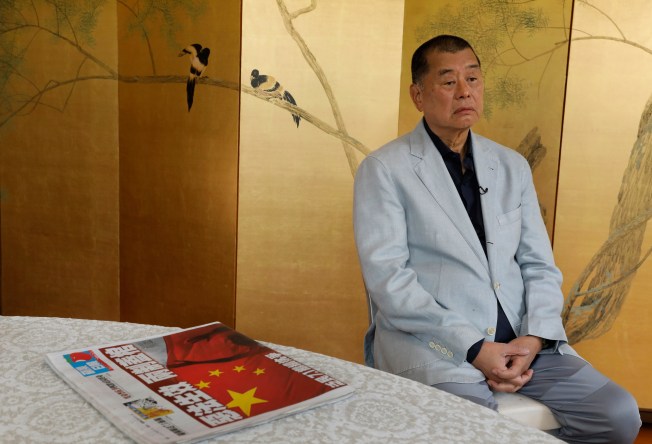CPJ presented its 2021 Gwen Ifill Press Freedom Award, for extraordinary and sustained achievement in the cause of press freedom, to Hong Kong media entrepreneur Jimmy Lai.
Lai has become a powerful symbol of the struggle to maintain press freedom in Hong Kong as China’s Communist Party exerts ever greater control over the territory. In prison, denied bail, the outspoken critic of the Chinese government and advocate for democracy faces charges that could keep him in jail for the rest of his life.

Born in 1947, Jimmy Lai arrived in Hong Kong at age 12 as a stowaway on a fishing boat. After starting as a child laborer in a garment factory, he rose to manager, eventually purchasing a bankrupt company and launching the clothing retail chain Giordano, where he made his fortune.
After the 1989 Tiananmen Square massacre, he launched Next magazine as part of his Next Media group (which became Next Digital in 2015). Following a critical column in the magazine in 1994, where Lai insulted then-Chinese Prime Minister Li Peng and told him to “drop dead,” China began to force branches of Giordano on the mainland to close, after which Lai sold his share of the company. He launched Apple Daily in 1995, introducing tabloid-style journalism to Hong Kong and later Taiwan, and has openly supported pro-democracy protesters in Hong Kong. Despite Apple Daily’s popularity, many large businesses have shunned the paper in what Lai has described as a politically motivated squeeze. Apple Daily offices and Lai’s home have been repeatedly attacked, including with fire bombs.
Lai was arrested in 2014 when he participated in pro-democracy demonstrations. He provoked China’s ire when, during widespread street protests in Hong Kong in 2019, he met with U.S. Vice President Mike Pence, Secretary of State Mike Pompeo, and House Speaker Nancy Pelosi during a visit to Washington, D.C.
His clashes with authorities intensified sharply in 2020, especially after the July enactment of a sweeping National Security Law. He was arrested on February 28, 2020, and again April 18 for alleged participation in unlawful demonstrations the previous year. Police again arrested Lai on August 10 under the National Security Law for alleged collusion with foreign powers. He was arrested again and denied bail on December 3 after being charged with fraud. He was formally charged under the National Security Act on December 11. He was granted bail on highly restrictive terms on December 23, only to have bail revoked on December 31. Subsequent applications for bail under the National Security law were denied on the grounds that he might commit further offenses under the law. He was arrested again while in prison on February 17, 2021, for allegedly helping 12 fugitives in their failed attempt to escape Hong Kong for Taiwan. On April 16, 2021, Lai was sentenced to 14 months in prison for the alleged organization of, and participation in, two unauthorized marched in 2019. A conviction in the ongoing National Security case could result in a sentence of life in prison.
On June 17, Hong Kong’s National Security police raided the office of Apple Daily, confiscating mobile phones and computers with journalistic material and arresting five senior editors and executives under the National Security Law on suspicion of colluding with foreigners.
International Press Freedom Awards >
Katsiaryna Barysevich, Belarus >
Anastasia Mejía, Guatemala >
Aye Chan Naing, Myanmar >
Matías Guente, Mozambique >